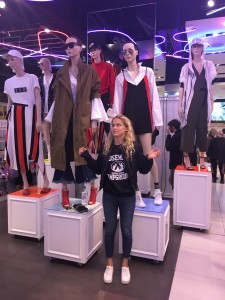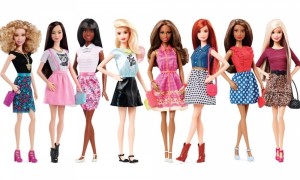Mannequins in leading high street retailers model clinically underweight female figures. Following a recent eye-opening shopping experience, Ellie discusses the damaging effects of unrealistic body images on female mental health.
Hi, my name is Ellie, and this Saturday I went and bought some jeans from Topshop.
Okay – don’t click away just yet. I promise this is going somewhere.
It is no secret that females in particular are bombarded with advertisements, beauty campaigns, magazines, fashion shows and more, all of which tell us what the ideal standard of beauty is, both facially and physically. So when I went to buy my Topshop jeans, I wasn’t surprised to see that all of the female mannequins used to display and sell these jeans conformed to a certain standard: tall, skinny and totally unachievable for the majority of women.

In fact, a recent piece of research from the University of Liverpool suggests that the female mannequins used by high street retailers SHOULDN’T be achievable: and that’s because they’re technically severely underweight. Looking at 58 mannequins from 17 retailers, researchers found that every female mannequin in every retailer had a body size that was the equivalent of an underweight human. So underweight, in fact, that the researchers suggested that if they were real women, they would not be able to menstruate. Not a SINGLE female mannequin was a normal body size.
“every female mannequin in every retailer had a body size that was the equivalent of an underweight human”
Interestingly, this was only the case for the 32 female mannequins. Out of the 26 male mannequins surveyed, only 8% had a body size equivalent to that of an underweight male human. The rest were perfectly normal.
Why, then, are females sold the idea of ultra-thinness as an ideal, when males aren’t? The researchers involved had the same question. If you’re an average-sized female – and in the UK, that’s a size 14 – you are effectively being told you’re not good enough every time you go shopping on the high street. As the researchers affirmed: “Mannequins aren’t people, nor do they have a sign on them saying ‘you need to look like this’. But they are representations of the human body that are used to sell fashion and the idea of beauty.”
What you could interpret these female mannequins as saying, is: ‘if you aren’t thin, you’re not beautiful’.
“women who are dissatisfied with their body shape or size are far more likely to go on to develop an eating disorder”
This is an issue that needs addressing. Promoting ultra-thin as the ideal is causing women to become more dissatisfied with their body size, because they’re regularly being shown body sizes that are physically IMPOSSIBLE to obtain. And we know that women who are dissatisfied with their body shape or size are far more likely to go on to develop an eating disorder, which can have devastating consequences. Anorexia nervosa alone has the highest mortality rate of any mental disorder, while bulimia nervosa and binge eating disorder are also on the rise, and can lead to severe medical complications. It’s also worth mentioning the fact that the number of UK inpatient eating disorder admissions has risen by an average of 7% year-on-year since 2005. Doesn’t that say something?

The fashion doll Barbie is a world-renowned children’s toy. One study has shown that Barbie as a real woman would be anatomically impossible and she would have to walk on all fours.
“Our women and girls are being shown unrealistic body images, every single day”
With Mental Health Awareness Week still fresh in our minds, it’s important that we continue to talk about this. Our women and girls are being shown unrealistic body images, every single day. They’re being told that their figures are not good enough, every single day. And it is affecting their mental health, every single day.
We can stop this. We can slow the rise of eating disorders, or even halt it completely, if we are able to change the way that society says women and girls should look. Not only do we need to get rid of the unrealistic body images being shown at every turn, but we also need to reiterate that being skinny is not the only way to be beautiful.
If there’s one take-home message to be gained, it’s this: you don’t need to aspire to be a Topshop mannequin. If you’re healthy and happy, you’re beautiful the way you are.
See below for a list of body-positive social media outlets:
https://www.instagram.com/bodyposipanda/
https://www.instagram.com/iskra/
http://stylelikeu.com/category/the-whats-underneath-project-2/
https://www.instagram.com/bodypositivitymovement/
https://www.instagram.com/thesabinakarlsson/


[…] The male mannequins used by high street retailers to market clothes represent a healthy body shape. The female mannequins represent an unhealthily thin body shape. That is the finding of research from the University Of Liverpool which is discussed in this article. […]